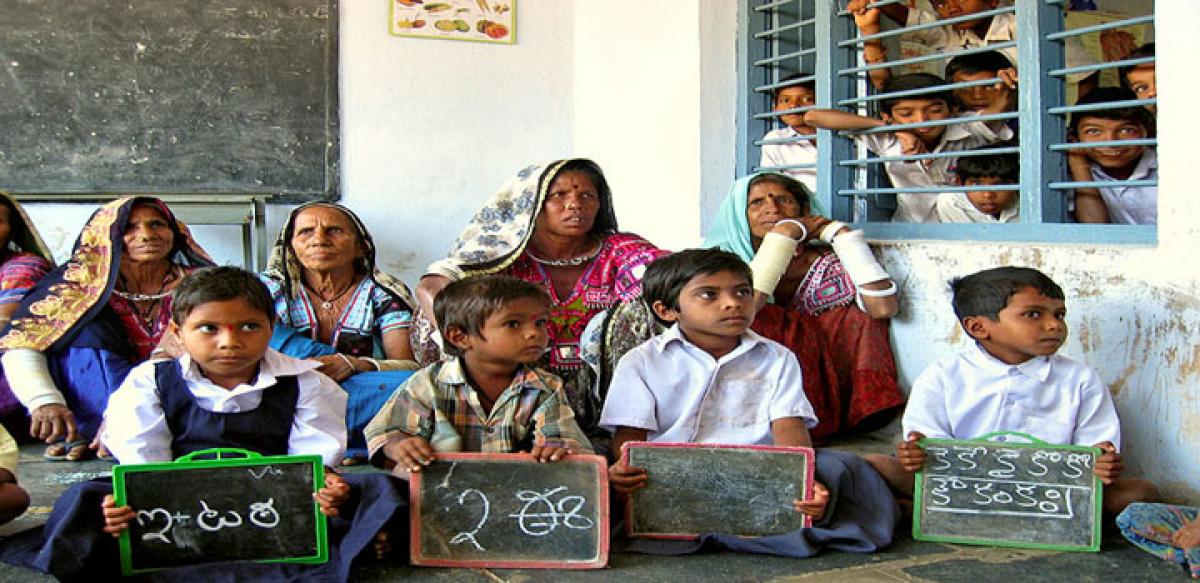Live
- Centre’s intent is to finish off small parties: DK Shivakumar
- Allu Arjun Released from Chanchalguda Jail, says he respects law
- Jesus is synonymous with sacrifice, forgiveness: Ponnam
- HC announces verdict in Kannada for the first time
- Uttam releases water from Nizam Sagar for Rabi crop
- TG to be Rs 84L cr economy in 10 years: Sridhar Babu
- First TGCHE, V-Cs meet deliberates on higher education roadmap for state
- 2 senior professors to join NALSAR
- Former Principal of SPW College passes away in US
- Hyderabad: Govt out to remove electric poles, transformers on roads across city
Just In

The Supreme Court on Monday referred the case relating to 100 percent reservations for tribal’s in teachers posts in the scheduled areas to a Constitution Bench as the case involves settling constitutional questions.
Governor’s order which his clients have challenged is unconstitutional as it violates the principle that the reservations should not exceed 50 per cent as held by the Supreme Court in the Indra Sawhney judgment
New Delhi: The Supreme Court on Monday referred the case relating to 100 percent reservations for tribal’s in teachers posts in the scheduled areas to a Constitution Bench as the case involves settling constitutional questions.
Justice Ranjan Gogoi, Justice Arun Mishra and Justice Prafullah C Pant heard the arguments in civil appeal number 3609 0f 2002, Chebrolu Leela Prasad Rao and others vs state of Andhra Pradesh. The petitioners in this case challenged the orders issued by the Governor under his constitutional powers over the scheduled areas through GO Ms.No.3 dated 10/1/2000 providing 100 percent reservations to Scheduled Tribes (STs) in scheduled areas to the exclusion of other categories.
This policy has created many problems in the tribal areas. Non-tribal teachers, who were recruited in tribal areas due to non-availability of tribal candidates, were later denied promotion. The aggrieved challenged the said GO in the apex court.
The lawyer for the petitioners, G V R Chaudary told The Hans India that the Governor order which his clients have challenged is unconstitutional as it violates the principle that the reservations should not exceed 50 per cent as held by the Supreme Court in the Indra Sawhney judgment.
The tribal’s account for only 48 percent in these scheduled areas. The total extent of reservations should either be within 50 percent or proportionate to the share in population, he added.
Nagati Narayana, Vice-President of School Teachers Federation of India (STFI), told The Hans India that the reservations for tribal’s in the predominantly tribal dominated state like Tripura is also only 31 per cent proportionate to their share in the overall state population .
He said that a total of over 100 MoUs have inked so far and the number will eventually touch 150. Later addressing media, AP Chief Minister Chandrababu Naidu maintained that the Partnership Summit had evoked overwhelming response as investors reposed faith in the state, in him and because of abundant natural resources available here.
The policy should strike a balance between the interests of tribal’s and non-tribal’s as the scheduled areas in Telangana and Andhra Pradesh have a sizable non tribal population too, he added.
Meanwhile, there are several representations to the state governments against the policy of reserving 100 percent posts for tribals in tribal areas citing many practical difficulties. For instance, the teachers’ posts in Urdu medium schools located in scheduled areas are vacant for decades due to non availability of tribal teachers who are qualified to teach in Urdu medium.
These posts remain vacant even after successive DSCs. The affected teachers argue that such a policy is hurting the interests of even tribal children as they are deprived of quality teachers from non tribals. However, the supporters of the policy of 100 percent reservations argue that this is aimed at ensuring the rights of tribal’s to employment.
Besides, the tribal’s can relate better to tribal children, they further argue. The larger constitutional bench verdict on this case is expected to have far reaching implications, opine legal experts.

© 2024 Hyderabad Media House Limited/The Hans India. All rights reserved. Powered by hocalwire.com







